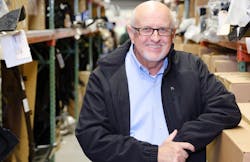Marvin Windham is no stranger to managing parts. He joined the industry out of high school and has managed departments of varying sizes, from small $300,000 facilities to one stocking $2.5 million in inventory per month. Today, he’s the parts director at Benchmark CJDR in Birmingham, Ala., which is the eighth-largest Mopar facility in the country with $2.4 million in Chrysler inventory alone and monthly sales of $1.8 million. The facility is run out of its own 30,000-square-foot parts warehouse, in addition to the 8,000-square-foot department in the adjacent dealership.
It’s a large enterprise, Windham says, and one that shows no signs of slowing down. The reason? Windham’s ability, and willingness to not only adapt, but also remain on the cutting edge and finding new ways to remain profitable––whether that’s in the dealership itself or through Windham’s creation of the Overnight Parts Alliance.
Innovation in the Dealership
Windham runs his department as though it’s a standalone dealership without wholesale. The parts he stocks there matches what they sell. The dealership, meanwhile, stocks based on RO sales. In the warehouse, he has 12 warehouse employees and 14 part-time in-town drivers that work on two shifts with seven delivery vehicles. His salespeople, of which there are 13, belong to another company and are paid by that outside company, then are invoiced back to Benchmark and Hendrick Chevrolet.
With only 38,000 square feet at the warehouse selling $1.8 million every month in just Chrysler inventory, Windham says the warehouse is crammed in every corner.
“That’s a tight fit for our parts, since we’re all collision,” he says. “We stock big parts and big quantities of big parts. Our sales are heavily sheet metal. I can’t stock two fascias because we sell five per day. We have to stock a little deeper and we’re still at eight turns per year.”
To maximize space, Windham put the shelves together closely and six months ago, hired a new parts manager who spent a significant amount of time in the warehouse, changing systems that looked good on paper but operationally, were inefficient.
“He’s made a huge difference in our efficiency of how we operate,” Windham says.
For example, he transitioned the warehouse to pick sheets instead of pick labels and decided that instead of segmenting the warehouse and having one parts puller pull only one part of the order and stage it, the puller pull a complete order.
“They walk more but it’s all together,” Windham says. “There’s a lot less time spent pulling the order.”
He also recently hired one person to oversee inventory full-time to ensure its accuracy. The inventory manager uses tablets and a scanner to check the inventory bins, straightens and verifies parts and is assigned bins as problem areas arise. The warehouse still does two inventories per year, one of which is an official inventory with an auditor.
“Every once in a while, we come in on a Saturday and count a section of bins to get them straight,” Windham says. “But it’s much better having him working all the time. We don’t have the issues. We have so many parts in process at any given time, it became a hard thing to run down our issues. But if you’re doing it with just one man, he can verify each part.”
Innovation in the Greater Industry
The Overnight Parts Alliance (OPA) began in 2001 as a joint marketing effort so that multiple dealerships could use the same outside salespeople and try to save on that cost.
“We were breaking up our deliveries with the people who were part of us,” Windham says. “Ford would deliver two routes, I would deliver a couple routes. That was hard to manage. We decided to get a separate location and pay for it separately and share the costs. Then we could carry the parts to one place and load up but keep the separate drivers.”
“We decided that we were running all over each other making deliveries,” he adds. “We figured out that we could share the workload of delivery and sales, thereby offering better service to our customers. I had known the other five managers for years. We all shared common values of honesty and growing our businesses through service. I am convinced another plus is that all the dealerships involved are independently owned franchises, with owners who are fully supportive of our efforts.”
What It Is: OPA is a unique group of non-competing dealers that give customers what they need to succeed and provide services in a cost-effective manner for dealers. Over the years, Windham and his staff have built up a fleet of trucks to where dealers pay a fee for taking on and managing the risk. Today it's a confederation of nearly 20 dealerships representing almost 30 brands that share delivery and customer service resources. Serving Alabama and portions of the five surrounding states, OPA allows participating dealers to more effectively serve their customers.
At its start, OPA had one delivery route. Today, it has 69 delivery routes per day in six states that, even if orders are submitted after 5 p.m., will be delivered before noon the next day within OPA’s delivery areas.
To more effectively manage OPA deliveries, Windham discovered that one of the biggest challenges was having the software available to manage a joint delivery operation. So, he hired a programmer out of Oregon to develop a software for him, called ShipTrack.
“Now I have all these parts people and parts managers, hundreds of people using this product every day and offering feedback,” Windham says.
The program allows Windham to track mobile deliveries and see in real time where a driver is at any given time, manage his customer contacts in one place so the outside salespeople can log their notes and utilize that information at any given times, it serves as a time clock, all truck maintenance and pre-inspections are logged through the system, as are returns.
“Our returns are through that software,” Windham says. “Returns from customers are really efficient now. All of that has been added since we started out. It’s evolved into a really complex program that’s very easy to use.”
The Evolution: Last year, Windham and OPA released a product line in collaboration with RBW Supply Co., MACC Solutions & Distributions, and Simoniz, called OPA Car Care Products. The idea, Windham says, is that customers use these products but were sourcing them from many different vendors. He hired a product specialist, Rob White, to build a product line that can help customers by streamlining sources and using OPA purchasing power to drive costs down.
“You can keep fewer products on the shelf with our next-day replenishment, which will be delivered by your regular OPA route salesperson,” Windham says. “We can also help transition the purchasing decisions to those higher in the management chain.”



